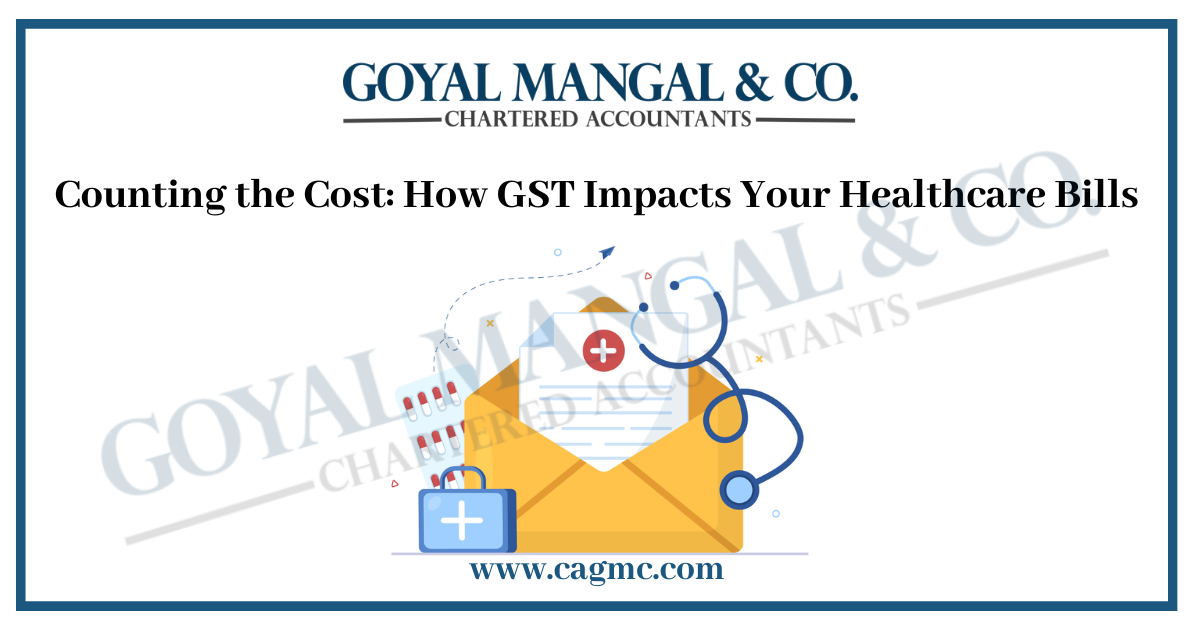
In the area of taxation and healthcare, the introduction of the Goods and Services Tax (GST) was a significant development. GST, a comprehensive indirect tax, has brought about significant changes in various sectors, including healthcare. This blog explores the nuances of healthcare taxation under GST, shedding light on the implications for both service providers and consumers. It is crucial to understand the influence of GST on healthcare services to effectively manage healthcare taxes.
|
Table of Contents |
Meaning of GST
GST, also known as Goods and Services Tax, is a tax that merges different indirect taxes. It’s like a unified tax that individuals pay at the time of purchasing any product or service. GST simplifies the tax system by replacing vaious taxes at various stages. An instance of this is seen, when you buy an item, where a part of your payment is allocated as GST and given to the government. The objective of this tax system is to enhance transparency and equity for businesses and consumers through simplification and bringing a uniform taxation approach.
Healthcare services under GST
Healthcare services are categorized as exempt or taxable under the implementation of GST. There are various exempt healthcare services under GST. Healthcare services that are not subject to certain regulations include services delivered by clinical establishments and medical practitioners who are officially authorized. These services are exempt from GST. However, healthcare facilities and other healthcare service providers are subject to a Goods and Services Tax (GST) rate of 5% on the services they provide. The GST rate on medical services was lowered by the government in 2018, from 18% to 5%. This led to healthcare becoming more affordable for the general public. People want to know how much GST is on hospital bill and much more.
Nevertheless, not every healthcare service is liable to the 5% GST rate. Services like cosmetic procedures, health evaluations that do not involve treatment, and specific medical equipment are subjected to the regular GST rate of 18%. Income tax rates for hospital in India is separate from GST rates.
Input Tax Credit under GST
Businesses can avail of the Input Tax Credit (ITC) on taxes paid for goods and services utilized in their operations under the GST system. This implies that companies have the opportunity to lessen their tax obligations by asserting the GST paid on various inputs like raw materials, machinery, and services such as marketing, accounting, and legal services.
Despite this, healthcare providers are unable to receive input tax credits (ITC) for the goods and services they use in providing healthcare services and pay GST. This is due to healthcare services being either exempt from taxes or subject to lower tax rates, and the patients cannot be charged for the GST paid on goods and services used in their healthcare.
Revised Hospital Room Rent with GST Tax Slabs
GST on hospital services are mentioned below:
- If the hospital room rate is below Rs. 5000 then the GST rate is 0%
- If the hospital room rate is more then 5000(other than ICU, CCU, ICCU, NICU) the GST rate is 5% without input tax credit.
- If the hospital room is for Intensive Care Units (ICU)/ Critical Care Units (CCU)/ Intensive Cardiac Care Units (ICCU)/ Neonatal Intensive Care Units (NICU) the the GST rate is 0%
The GST Rates for healthcare commodities
GST rates on healthcare services are:
- The GST rate on commodities such as contraceptives and human blood is 0%
- The GST on doctors’ consultation fees is zero that is it is exempt from GST.
- The GST on medicines, animal and human blood vaccines is 5%
- The GST on Ayurvedic Medicines, Medicinal Grade Hydrogen Peroxide, Anaesthetics, Potassium Iodate, Iodine, Steam, Glands, and Other Organs for Organo-Therapeutic Uses, Ayurvedic, Unani, Homoeopathic Siddha or Biochemical Systems Medicaments, Sterile Suture is 12%
- The GST on Tampons and disinfectants is 18%
- The GST on surgical items is 12%
- The GST on hot water bags is 28%
- The GST on wheelchairs is 18%
- The GST on the wing scale is 28%
Conclusion
In conclusion, the role of GST in the healthcare industry is crucial, influencing the accessibility, affordability, and innovation within healthcare services. Striking a careful balance in tax policies is essential to ensure that the benefits of GST contribute positively to both the industry and the public. Ongoing dialogue and adaptation are crucial to align tax regulations with the dynamic needs of the healthcare sector, fostering a system that promotes quality care, research, and overall well-being.


